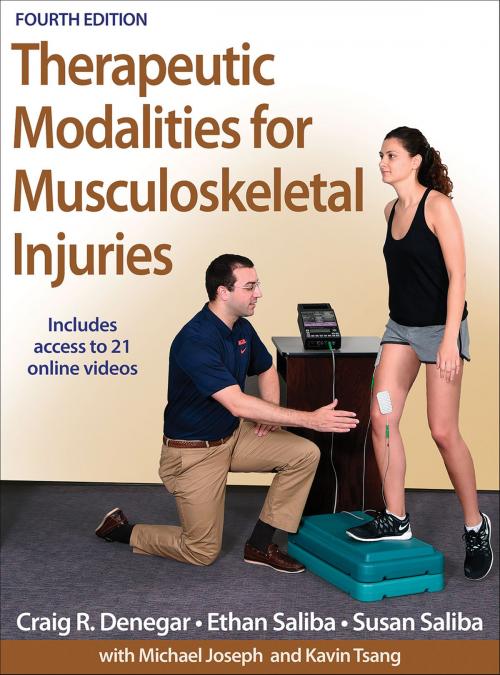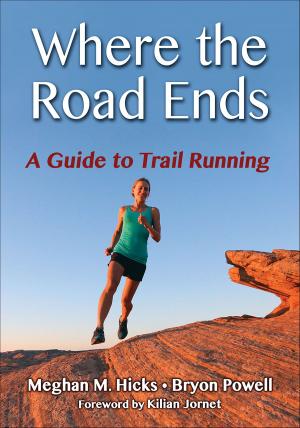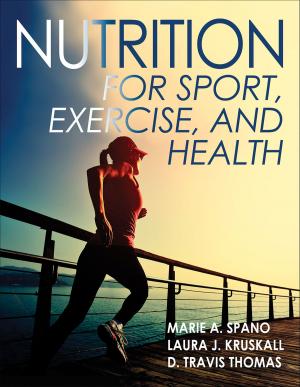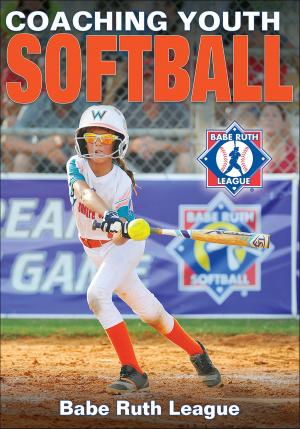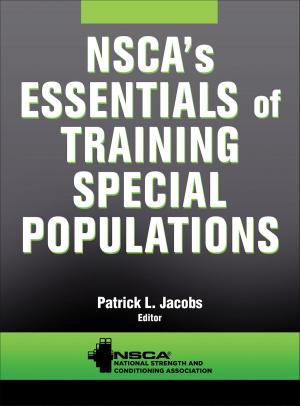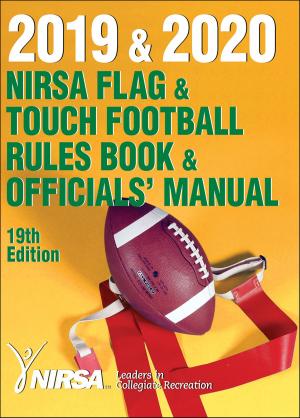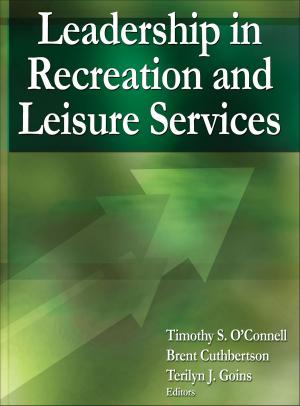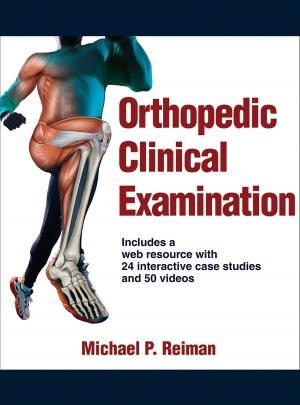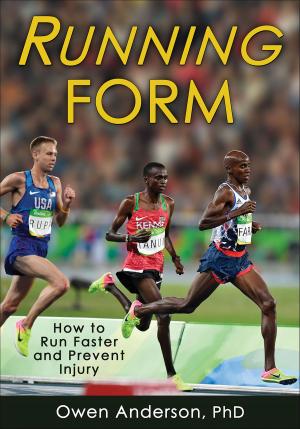Therapeutic Modalities for Musculoskeletal Injuries
Nonfiction, Health & Well Being, Medical, Specialties, Physical Medicine & Rehabilitation, Sports Medicine| Author: | Craig R. Denegar, Ethan Saliba, Susan F. Saliba | ISBN: | 9781492585350 |
| Publisher: | Human Kinetics, Inc. | Publication: | November 23, 2015 |
| Imprint: | Human Kinetics, Inc. | Language: | English |
| Author: | Craig R. Denegar, Ethan Saliba, Susan F. Saliba |
| ISBN: | 9781492585350 |
| Publisher: | Human Kinetics, Inc. |
| Publication: | November 23, 2015 |
| Imprint: | Human Kinetics, Inc. |
| Language: | English |
Therapeutic Modalities for Musculoskeletal Injuries, Fourth Edition With Online Video, offers comprehensive coverage of evidence-based therapies for rehabilitation of musculoskeletal injuries. The information aligns with the Board of Certification’s Role Delineation Study/Practice Analysis, Sixth Edition, and the Commission on Accreditation of Athletic Training Education’s Athletic Training Education Competencies, Fifth Edition, and is a vital resource for students preparing for examinations as well as professionals in the field who wish to stay informed of the latest research.
Therapeutic Modalities for Musculoskeletal Injuries, Fourth Edition, applies evidence-based research and clinical experiences of top practitioners in the field to optimize the care of musculoskeletal injuries and provides students and practitioners with solid fundamentals in development of rehabilitation programs. The content of this fourth edition has been significantly updated and revitalized to include all modalities that coincide with BOC requirements and offers the latest in contemporary science in the field. Further updates include the following:
• New online video that corresponds to modalities discussed throughout the text, directly demonstrating how to apply techniques to individual patients
• A new chapter on mechanobiology that provides new understanding of the effects of movement and activity on cell function
• A new chapter on the application of exercise as a stimulus for tissue repair
• Additional information on the principles and clinical applications of cold, heat, electrotherapy, laser, and ultrasound
• Updated and revamped case studies and guided scenarios that apply all modalities found throughout the book to real-world situations
The content of the book is organized in parts to logically address therapeutic interventions for musculoskeletal injuries. Part I explains the core concepts of therapy, specifically in terms of clinical practice, and part II addresses the physiology of the acute response to tissue damage, tissue repair, and pain. Part III examines electrical modalities for pain management, provides an introduction to neuromuscular control, and addresses the use of biofeedback and neuromuscular stimulation to restore neuromuscular control in rehabilitation. Parts IV and V delve into a critical evaluation of therapeutic applications of cold, superficial heat, ultrasound, electromagnetic fields, and low-power laser therapy. Part VI examines foundational concepts of mechanobiology and explains how and why exercise and mechanical forces are essential to musculoskeletal tissue repair. Part VII brings all of the concepts from the text together through a series of case studies and guided scenarios, which allow students to apply fundamentals to real-world situations.
Therapeutic Modalities for Musculoskeletal Injuries, Fourth Edition With Online Video, contains many learning features to assist comprehension, including chapter objectives, key terms and a glossary, sidebars with clinical application of current concepts, and chapter summaries. Additionally, access to 21 online videos of applying modalities in clinical practice will help students better understand concepts from the text. For instructors, a robust set of ancillaries is provided, including a fully updated test package and instructor guide, as well as a newly added presentation package plus image bank to assist with lecture preparation. Ancillary material can be accessed online at www.HumanKinetics.com/TherapeuticModalitiesForMusculoskeletalInjuries.
Therapeutic Modalities for Musculoskeletal Injuries, Fourth Edition, explains how to apply each therapy and addresses why and when a therapeutic intervention can improve the outcome of care. Students and professionals alike will develop stronger decision-making skills when determining the safest and most effective use of each treatment method.
Therapeutic Modalities for Musculoskeletal Injuries, Fourth Edition With Online Video, offers comprehensive coverage of evidence-based therapies for rehabilitation of musculoskeletal injuries. The information aligns with the Board of Certification’s Role Delineation Study/Practice Analysis, Sixth Edition, and the Commission on Accreditation of Athletic Training Education’s Athletic Training Education Competencies, Fifth Edition, and is a vital resource for students preparing for examinations as well as professionals in the field who wish to stay informed of the latest research.
Therapeutic Modalities for Musculoskeletal Injuries, Fourth Edition, applies evidence-based research and clinical experiences of top practitioners in the field to optimize the care of musculoskeletal injuries and provides students and practitioners with solid fundamentals in development of rehabilitation programs. The content of this fourth edition has been significantly updated and revitalized to include all modalities that coincide with BOC requirements and offers the latest in contemporary science in the field. Further updates include the following:
• New online video that corresponds to modalities discussed throughout the text, directly demonstrating how to apply techniques to individual patients
• A new chapter on mechanobiology that provides new understanding of the effects of movement and activity on cell function
• A new chapter on the application of exercise as a stimulus for tissue repair
• Additional information on the principles and clinical applications of cold, heat, electrotherapy, laser, and ultrasound
• Updated and revamped case studies and guided scenarios that apply all modalities found throughout the book to real-world situations
The content of the book is organized in parts to logically address therapeutic interventions for musculoskeletal injuries. Part I explains the core concepts of therapy, specifically in terms of clinical practice, and part II addresses the physiology of the acute response to tissue damage, tissue repair, and pain. Part III examines electrical modalities for pain management, provides an introduction to neuromuscular control, and addresses the use of biofeedback and neuromuscular stimulation to restore neuromuscular control in rehabilitation. Parts IV and V delve into a critical evaluation of therapeutic applications of cold, superficial heat, ultrasound, electromagnetic fields, and low-power laser therapy. Part VI examines foundational concepts of mechanobiology and explains how and why exercise and mechanical forces are essential to musculoskeletal tissue repair. Part VII brings all of the concepts from the text together through a series of case studies and guided scenarios, which allow students to apply fundamentals to real-world situations.
Therapeutic Modalities for Musculoskeletal Injuries, Fourth Edition With Online Video, contains many learning features to assist comprehension, including chapter objectives, key terms and a glossary, sidebars with clinical application of current concepts, and chapter summaries. Additionally, access to 21 online videos of applying modalities in clinical practice will help students better understand concepts from the text. For instructors, a robust set of ancillaries is provided, including a fully updated test package and instructor guide, as well as a newly added presentation package plus image bank to assist with lecture preparation. Ancillary material can be accessed online at www.HumanKinetics.com/TherapeuticModalitiesForMusculoskeletalInjuries.
Therapeutic Modalities for Musculoskeletal Injuries, Fourth Edition, explains how to apply each therapy and addresses why and when a therapeutic intervention can improve the outcome of care. Students and professionals alike will develop stronger decision-making skills when determining the safest and most effective use of each treatment method.
